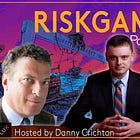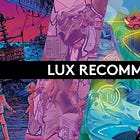Punching toward happiness, men at work, and flounder mode. Plus the CIA in the 21st century with Tim Weiner.
It’s a glorious 70 degrees in New York City, which means it’s time to log off for Labor Day Weekend. Before I run outside to do more email though, it’s time for Lux Recommends.
My new print magazine piece for City Journal was posted online yesterday, headlined “AI Can Solve the Fiscal Crisis for Cities—If We Let It.” Thinking about pension obligations is alarming of course (particularly when we are celebrating labor!), but there is a path forward for our municipalities if AI productivity in government can propel efficiencies in the decade ahead.
AI is not a jobs-protection mechanism or a vehicle for cultural crusades. It is a vital tool for mayors and city leaders to confront structural fiscal challenges. Done right, it could reshape urban life—replacing decline with dynamism and opportunity.
From Lux Capital
This week, Josh Wolfe went on The Information to talk with host Jessica Lessin about venture capital’s future and the “poachapalooza” for AI talent.
Josh was also quoted on CNBC’s “The Exchange” after Commerce Secretary Howard Lutnick said earlier in the week that the government should consider taking stakes in U.S. defense companies. The moment government takes equity stakes, you’ve just signed the death certificate for the next generation of defense unicorns, he said. “Why would any VC fund Anduril when they know they’re competing against companies where Uncle Sam is literally a shareholder?”
This is an issue I’ve previously touched on in Riskgaming.
From around the web
1. Life’s punchline
Here at Riskgaming, we’re spending the long weekend thinking about the meaning of work, how to define “success,” and what it takes to live a good life. On that subject, I found Gordon Marino’s new piece in The Point well worth a read. Gordon, who is a boxer trained in one of the sport’s most influential gyms, makes the case that going head-to-head with your fears is key.
For the ancients, temperance or self-control was the master key to the good life. The American ethos is heavily weighted in a different direction, toward passion and gusto. We lovers of the American dream, with all our pieties about freedom, deceive ourselves into thinking there is nothing more to acting freely than doing what you desire. As Bob Dylan sings, “Are birds free from the chains of the skyway?” Are those of us chained to our desires free just because we are able to do what we want to do, even if we can’t control what that is?
2. Hornswoggled
A slightly different take on these matters appealed to our scientist-in-residence, Sam Arbesman. In the brilliantly titled “Flounder Mode,” Brie Wolfson profiles Kevin Kelly, the futurist of 1,000 ventures who repudiates Silicon Valley’s lionization of the kind of singular drive that turns founders into unicorns.
I asked Kelly about the tradeoffs of focusing on a single thing if you want to be great (which is what I had been getting at before). “Greatness is overrated,” he said, and I perked up. “It’s a form of extremism, and it comes with extreme vices that I have no interest in. Steve Jobs was a jerk. Bob Dylan is a jerk.”
3. The brandwagon
Neither the advice from Gordon Marino nor Kevin Kelly is the kind of thing aspiring journalists hear much about these days. Rather, they are more likely to be told that their career will depend on them “building their brand.” I recommend Sophie Endrud’s work in Poynter explaining the history of that phrase and the increasingly nonsensical way in which it is used.
“Most of the younger folks who have gone to journalism school are doing so because they fell in love with an ideal of what being a journalist is and what that looks like,” she said. “I think (they) thought they were stepping into a world where they would become a part of these machines, right, these wonderful machines, and so didn’t always think about themselves in isolation, as a standalone brand.”
Independent journalists have to think about their role as both founder and journalist, building a relationship with their audience while staying true to journalistic ethics and transparency. It’s a delicate balance, but for many, owning their own work is the key to surviving and thriving in an increasingly unstable media landscape.
4. Men not at work
Editor Katie Salam’s contribution to the jobs and happiness theme is “Wanted: Manly Jobs for Manly Men,” from Virginia Postrel. We’ve all heard a lot about male unemployment — from the right and from the left — but Virginia’s take on what is going on is distinct.
What has actually happened is not that men can’t find employment. It’s that today’s well-paid “masculine” jobs generally require more self-discipline than the regimentation of a factory. A construction site has bosses but you don’t work at machine pace. The same is true of a warehouse or hospital. Autonomy has increased but, with it, so has the need for continuous self-control, even in environments where workers and results are strictly monitored.
Higher pay also tends to come along with high levels of equipment (aka capital) rather than labor-intensive work.
5. K-boom
If you’d prefer not to spend the weekend thinking about life, work, and happiness, perhaps think of South Korea. For decades, the country’s stock market suffered from the “Korea discount,” where stocks were undervalued relative to the companies’ performance because of the influence of powerful families over the biggest firms. In the wake of Lee Jae-myung’s victory in South Korea’s presidential elections, though, the stock market is ripping because of pledges to reform corporate governance.
On June 2, the Korea Composite Stock Price Index (KOSPI)—the weighted index of all common stocks traded in the Korea Exchange—closed at 2,698.97. Around two months later on Aug. 4, the index closed at 3,147.75—a remarkable 16.6 percent increase, outpacing Japan’s TOPIX index (which saw a 3.7 percent gain) and even the United States’ Dow Jones Industrial Average index (6.7 percent gain) in the same period.




